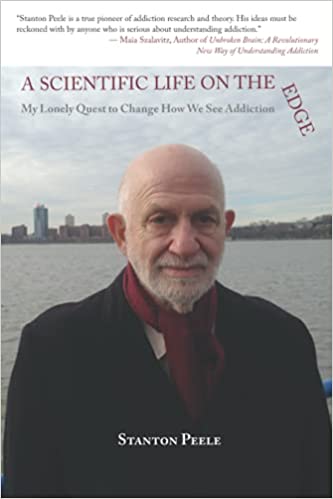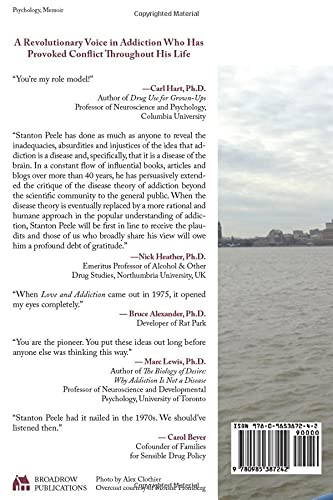Links to books on this page are Amazon affiliate links. For those who want to avoid Amazon, links to titles available at BetterWorldBooks are provided at the bottom of this post.
Dr. Stanton Peele has been a heterodox voice in the field of addiction since his 1975 release of “Love and Addiction“, co-written with friend and frequent collaborator Archie Brodsky. “Love and Addiction” was groundbreaking for its time. The book claimed that human behaviors such as ‘love’ could be as addictive as drugs.
And that an addiction to love could be as harmful as one to the drugs more commonly focused on in addiction discourse, like heroin or alcohol.
Now, at the time of this writing, I have yet to read “Love and Addiction”. But I understand its significance. And I’ve also had the privilege of recording a conversation with Dr. Stanton Peele. This conversation will be released in the coming weeks and I will update this book review once it is ready to watch and listen.
I have, however, read other work by Dr. Stanton Peele. I first became aware of Dr. Peele through Zach Rhoads. Together, they wrote the book “Outgrowing Addiction: With Common Sense Instead of “Disease” Therapy“, released in 2019. I recorded a podcast with Zach Rhoads and also created a video animation summary of “Outgrowing Addiction”.
Additionally, Dr. Stanton Peele and Zach Rhoads collaborate on an addiction recovery program called Life Process Program and a YouTube channel by the same name.
Through this connection, I discovered the work of Dr. Stanton Peele and was delighted to read and review his latest book “A Scientific Life on the Edge: My Lonely Quest to Change How We See Addiction“. Keep reading to see my review of Dr. Stanton Peele’s new book, released in 2021.
A Summary of “A Scientific Life on the Edge”
“A Scientific Life on the Edge” is, at its core, a memoir. Fans of Dr. Peele will be delighted to read this new book (totaling 400 pages according to Amazon) and learn more about his childhood and the experiences that sparked his interest in addiction. He revisits his early home and provides reflections on his family life. Examples of this include his mother’s preference of Stanton over his older brother Jeff. And the tendency of his father to resort to outbursts of anger when confronted with adversity. These subjects are approached with a more ‘journalistic’ approach, where Dr. Peele generally aims to tell things as they were, as opposed to analyzing them more philosophically or psychologically.
His detractors (of which Dr. Peele himself will admit there are many), however, will find plenty to get hung up on in this new book. But I’ll get into that later.
While Dr. Peele’s newest book is intended to be a memoir, it is also an overarching summary of his life’s work and his perspectives on addiction. Perspectives which, along with his unwillingness to compromise on his beliefs, have made him an outsider in a field he has helped revolutionize.
In “A Scientific Life on the Edge”, Dr. Peele doesn’t hesitate to poke holes in the disease model of addiction and the addiction therapy programs that push it, like Alcoholics Anonymous. Indeed, there are many paragraphs devoted to other addiction and drug researchers and writers, like Dr. Carl Hart, Johann Hari and Maia Szalavitz. In these sections, Dr. Peele doesn’t hold back in critiquing where he believes his peers and contemporaries have got it wrong.
Though, in his defense, he does take care to acknowledge where they’ve gotten things right. Well, so long as Dr. Peele believes they actually have gotten something right.
Dr. Stanton Peele is firm in his beliefs. And, throughout the book, he highlights the scientific evidence and life experiences that contributed to the evolution of his beliefs. He recalls his first visit to a laboratory where addiction was being studied in monkeys and his disbelief at discovering the conditions in which these studies were being performed (an experience that would later inspire the Rat Park experiments). He details his seemingly out-of-place experience in the Harvard Business school as an instructor. And he writes about time spent abroad in countries like South Africa.
And, in addition to sharing experiences that directly relate to his work as an addiction expert, Dr. Peele also opens up about the women he met and loved along the way.
The book is broken up into four parts. These four parts provide a sort of chronological structure to the memoir, starting with a brief analysis of the current moment and Dr. Peele’s place in it. The memoir then travels back to Dr. Peele’s earliest memories and works its way back to the current moment, before ending with speculation on the future.
But, for the sake of this review, I think it’s helpful to think of this memoir as having three main themes:
- Dr. Peele’s personal life
- His addiction model
- The addiction field and his place in it (and outside it)
The Good and Bad of “A Scientific Life on the Edge”
To keep this simple, here are a few points I would highlight if any potential reader were to ask for my assessment of the book.
The Good
- People who are familiar with Dr. Stanton Peele before reading this book will already be aware of his ideas on addiction. For those readers, this book is an interesting look at the man behind those ideas. There are dozens, probably hundreds, of pages dedicated to his personal life. These details include family, education, early work and as mentioned above, romances. Plus, there are pictures!
- “A Scientific Life on the Edge” is not a difficult read. The book is made up of four parts with 3-4 chapters per part. And within each chapter, there are many sections. And included with those sections are headers which describe the subsequent text. This makes it a good read for people who like to chip away at books in bits.
- It is exceedingly honest. Whether you agree or disagree with Dr. Peele, one has to admire the honesty with which he approached this book (and his work more broadly). He doesn’t hold back when critiquing others in the addiction field. And, while some readers may be turned off by this approach, for me it was refreshing. Dr. Peele never leaves the reader guessing about his opinion of mainstream addiction thought or its thinkers. And, perhaps more importantly, the logic behind his opposition and the presentation of thoughtful alternatives are always provided.
The Bad
- In his new book, “A Scientific Life on the Edge“, Dr. Peele spends a lot of time talking about himself – it is a memoir after all. But it’s done in a very particular way. Readers who harbor skepticism about Dr. Peele or his ideas, or perhaps even newcomers to Dr. Peele, may be turned off by how this first person narrative is approached. Readers sympathetic to Dr. Peele and his work might call it ‘self-assured’. Critics will almost certainly call it ‘self-righteous’.
Overall “A Scientific Life on the Edge” Review
I wanted to make this part of the book review a binary call-to-action (Read it! or Don’t read it!). But it’s not that simple. For those readers who are aware of and find themselves agreeing with Dr. Peele, the book is an easy recommendation. These readers will finish the book with a deeper understanding of and respect for its author. Fans of Dr. Peele will gain a lot by reading this new book.
And while the ‘Read It!’ recommendation is clear for Dr. Peele’s fans, the opposite is equally clear for his critics. I would be extremely surprised to hear of a Dr. Peele critic finding him or herself in greater agreement with the author after finishing the read. Indeed, feelings of resentment towards Dr. Peele are likely to only be exacerbated by his newest work.
So, the real question for me is… what to do with people who have never heard of Dr. Stanton Peele?
In those cases, I would recommend reading one of his earlier works. I can only recommend “Outgrowing Addiction” with confidence, since, well… that’s the only other book of his I’ve actually read at this time. But many readers have been positively impacted by earlier works like “Love and Addiction“, “Diseasing of America” and “The Meaning of Addiction“, (all books I will be reading in the immediate future) among others. Those might be better places to start than with “A Scientific Life on the Edge”. Another option is to start with the Life Process Program YouTube channel to get a feel for Dr. Peele and his approach.
Buy “Love and Addiction” at BetterWorldBooks.
Buy “Diseasing of America” at BetterWorldBooks.
Buy “The Meaning of Addiction” at BetterWorldBooks.
There is a ton of value to be extracted from “A Scientific Life on the Edge“, but those who are not prepared for the personality of its author may not stick around long enough to find it.


